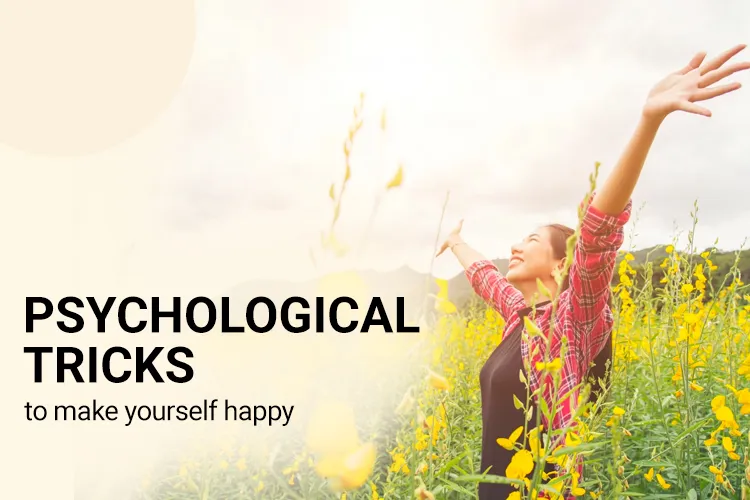Our brain is wired to experience happiness and pleasure when we engage in certain activities or experience certain events. One of the most interesting things about the human brain is that it responds to physical cues, such as facial expressions, to trigger the release of feel-good chemicals in the body. This is why we feel happier when we smile, even if we don’t necessarily feel happy in that moment. But what if we could intentionally use psychological tricks to make ourselves feel happier, even when we are not necessarily in a happy mood? In this article, we will explore some of the most effective psychological tricks to make yourself happy, based on scientific research.
Gratitude Journalling
One of the most effective ways to boost your mood is to practice gratitude journaling. This involves writing down three things you are grateful for each day. The act of focusing on the positive aspects of your life can help shift your attention away from negative thoughts and emotions. Research has shown that people who practice gratitude journaling regularly experience higher levels of happiness, optimism, and life satisfaction.
Positive Self-Talk
Another powerful psychological trick to make yourself happy is to practice positive self-talk. This involves consciously reframing negative thoughts into more positive ones. For example, if you find yourself thinking “I am never going to be able to do this,” try reframing it as “This is a challenge, but I am capable of overcoming it” Research has shown that people who engage in positive self-talk experience lower levels of stress and anxiety, and higher levels of self-esteem and resilience.
Exercise
Exercise is a well-known mood booster, thanks to the release of endorphins it triggers in the body. But did you know that the type of exercise you do can also impact your mood? High- intensity exercise is particularly effective at boosting mood, as it increases the release of endorphins and other feel-good chemicals in the body. However, even low-intensity exercise, such as going for a walk or doing yoga, can still have a positive impact on your mood.
Get expert therapist counselors to get yourself treated for depression in effective ways.
Social Connections
Human beings are social creatures, and research has shown that social connections are crucial for our happiness and well-being. Spending time with loved ones, or even just having a brief conversation with a friendly stranger, can boost our mood and make us feel more connected. If you are feeling down, try reaching out to a friend or family member for a chat,
or join a local social group to meet new people.
Acts of Kindness
Performing acts of kindness for others can also boost your own happiness levels. This can be as simple as holding the door open for someone, or as involved as volunteering at a local charity. Research has shown that people who engage in acts of kindness experience higher levels of happiness and life satisfaction, as well as lower levels of stress and depression.
Mindfulness Meditation
Mindfulness meditation involves focusing your attention on the present moment, without judgment or distraction. This can help reduce feelings of stress and anxiety, and increase feelings of calm and relaxation. Research has shown that regular mindfulness meditation can also increase positive emotions such as joy, contentment, and gratitude.
Music
Music has a powerful impact on our emotions and can be a great tool for boosting our mood. Listening to upbeat music can trigger the release of feel-good chemicals in the brain, such as dopamine, and can also distract us from negative thoughts and emotions. Next time you are feeling down, try putting on some of your favorite music and see if it helps improve your mood.
Visualisation
Visualization is a powerful technique that can help you improve your mood and reduce stress levels. This technique involves imagining a happy scenario or event, such as a fun
vacation or a successful accomplishment. By focusing on this positive image, you can shift your mindset from negative thoughts to positive ones. Visualization can be done in many ways, such as through meditation or guided imagery. Research has shown that visualization can help boost mood, increase motivation, and improve overall well-being.
Laughter
Laughter is often called the best medicine, and for good reason. Laughing can help reduce stress and boost your mood by releasing endorphins, which are natural feel-good chemicals in the brain. You can incorporate laughter into your daily routine by watching a funny movie or TV show, reading a humorous book, or spending time with friends who make you laugh.
Mindful Breathing
Mindful breathing is a technique that involves focusing your attention on your breath and being present in the moment. This technique can improve your mood. To practice mindful breathing, simply take a few deep breaths and focus on the sensation of the air moving in and out of your body.
In conclusion, there are many psychological tricks that you can use to make yourself happier. While traditional methods like exercise and social connections are effective, these lesser-known tricks can be just as powerful. By incorporating these techniques into your daily routine, you can improve your mood, reduce stress levels, and boost your overall well-
being.
How do you apply wellness in your life? Consult our online therapist to get the perfect guide.
With Ganesha’s Grace,
The GaneshaSpeaks.com Team



